"Silver Stars" Shine Brightly for Vision Four 5
When word reached me a week ago that Vision Four 5 were back on the gigging scene again, a shiver went up my spine and a rush of excitement went through me. This was the band that way back in 90-96 or so belted out tracks such as "Everything You Need", "Cyberphobia", "Purple Lamp" and released two albums "Texture" and "Humid" on Volition, the Australian label that typified the Australian electronic / dance music sound at the time. Vision Four 5 were one of the forerunners of this period, combining both music, lyrics and undeniably amazingly interactive graphics using the Amiga 'Mandala' system which provided real-time triggers for sounds and visuals during their energetic live performances. The interactive component of their live performances set them apart from all other Australian bands of the time, and I would even go far as to say from the majority of bands who currently perform these days.
Noel Burgess, currently one of the Australian dance music industry's most respected members was the man behind the music and Tim Gruchy designed and conceptualized the interactive components and videos. Their live performance had them standing on stage, waving arms in the air in front of large screens, not just for that 'put your hands up in the air' rave momentum, but also to use their bodies as controllers for triggering the sound and visuals via digital interactive computer systems & video cameras converted into real-time computer graphics which triggered midi sounds and visual trigger points adding extra layers to the live performance. This time round Tim is not part of the band, but Mike Crane is controlling the visual experiences. Luckily for us, Vision Four 5 are heading out to perform live once again and introduce the newcomers to the scene to their magic.
I had a chance to speak to Noel Burgess from Vision Four 5 about his upcoming gig alongside Ultrasonic (@ Gas, Sydney, Sat 5th Oct 2002) as well as a general chat to find out more about the man behind the music.
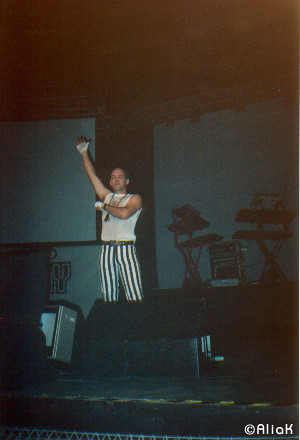
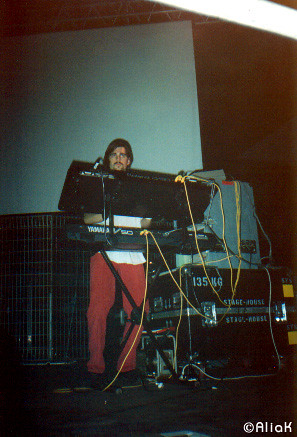
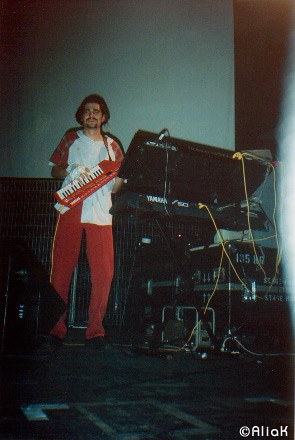
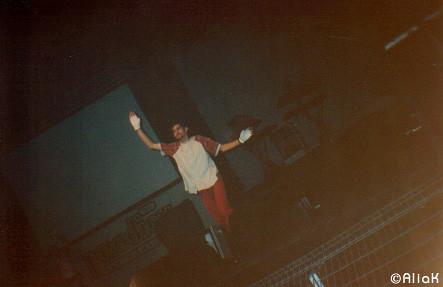
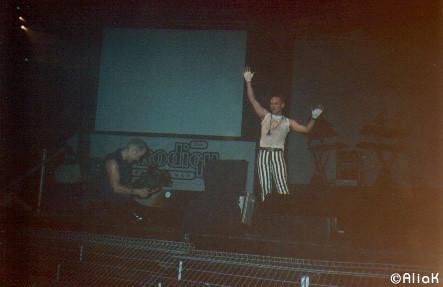
Vision Four 5 using Mandala - 1992 Prodigy NYE, Sydney
Tell us a bit about your background..
Noel Burgess: "A brief chronology: it's fairly straight forward first six years. Form band. Start gigging. Write material. Get record deal. Put out two albums and singles and do lots of touring in that time. Very frenetic. Record label goes down. Band kind of grows apart as they pursue their individual careers. My interest was in producing so I go and work with producing other artists because at that point, not a lot of people had done many let alone a couple of albums in an international dance music kind of style - literally a handful of people like Dave Smith, Paul Mac, Southend, us and a couple of guys in Melbourne. Then worked with Infusion who had just popped up from Woolongong and spent three years sharing a studio with GT (Groove Terminator) and I worked on his first album. Did a few other albums here and there of various styles, and remixes etc. And did my own solo project as F.I.S.T. which was more tech oriented - just straight kind of minimal tech style. Now I feel I'm ready to be getting back in because dance music is proliferating in a really commercial fashion which is really getting a lot of new people into the scene. It just feels like the right time to be supporting it again. I have done a track with Jacqui Hunt, the singer from Single Gun Theory "Silver Stars (burn)" available soon via Warner Music imprint, Higher Sound/Kompactor records]. And have remixed some older works for which the copyright has now returned so I can do what I want with them. I want to write some more stuff, basically working towards a new album next year, which will be a combination of old and new material. Gigging is a way to force the generation of material and a really good testing ground for it. So by the time it comes out after a season of gigs, you've generally got something that people want to hear."
Vision four 5 would be the most interactive performance I've ever seen, especially once the crowd knew what you were doing when you were waving your arms around in front of the screens to trigger sounds and visuals..
NB: "Yeah, some comments we got were 'It's amazing how well the visuals synced up to what we were doing on stage' - which is absurd!"
Are you bringing the interactivity aspects back? Is it going to be similar to the Mandala system you used to use with Tim Gruchy?
NB: "Initially, it's definitely in the audio/visual realm. Mike Crane is the new person providing the visuals. We have an interest in exploring the interactive elements as well. At this stage it's basically me looking after the music, and Mike looking after all the visuals. It's all original material with the set and it's all interpretation. We have four cameras on stage as well. It's very much a performance and that's the elements at the moment. We hope to grow an interactive layer to the show, but it's been so much work to build a new set from the ground up that, that will come over the next few shows - we'll start integrating the interactive elements and the use of alternate controllers."
What's Mike Crane's background?
NB: "His background is in VJing. I actually met him when he was VJing at Two Tribes. He took up where Tim left off in the dance music scene in doing visuals. I mean, Tim was very much a pioneer in doing VJ culture - he'd never call himself a VJ but that culture spurned out of his efforts in visuals doing right back in the mid 80s, all the way along."
Yeah and way back to Severed Heads days..
NB: "That's right. Mike has sort of picked up where Tim left off as far as the party scene comes from and the technology's changed a lot. It's all become a lot more powerful and a lot more affordable and miniaturized and handleable. The other thing about Vision Four 5 is that we're at a very, very exciting time technologically now, and it's taken the last five years to actually go through several generations of tech, that have been all very transitory. We've actually settled in the last two years. We're reaching certain limits in computer technology which means we've sort of slowed the progression a bit. I mean it's still expanding and increasing at an extraordinary rate but compared to the expense of the rate of obsoleteness that we've experienced in five years previously with a lot of serial format interface standard changes and all of those kind of systems and the older kind of systems being dropped and new ones coming in. That's all happened now, we've got a new set of standards which is very, very exciting because basically the cost of the equipment we were using ten years ago and what we could get out of it is 1/100th of the power that we have now for considerably less cost."
"I'm just not seeing anything remarkable done with it. You know? All of this power is going into making the technology so seemless and, a lot of people are spending a lot of time trying to recreate existing works rather than do things that are now new. It's the new possibilities I'm not seeing. Ten years ago it was a really exciting time - computer technology took a few quantum leaps and totally new art forms were created and new ways of using computers emerged. That kind of died off when that became commonplace and part of the society. We're now at a stage where it's stable enough and advanced enough, and the software that's out now is considerably more advanced than it was ten years ago. I see there's huge opportunities for another wave of new expression and uses for this technology, and we're willing to put our hands up and try and explore it!"
Yes, because say ten years ago people were pushing the boundaries of that technology with the music they were creating and visuals if they were also doing them. For example, you'd put in so many layers of sounds and that's all you could do because that's all the gear would take. I understand what you're saying, because now, whilst it's so much cheaper for disk space and memory or whatever, people don't really seem to be pushing those boundaries anymore..
NB: "No not at all. It's now become such a consumers' field, which is like any kind of new field - you sort of push the boundaries of what's possible and then that becomes comfortable, and then that becomes a consumer field, and then that promotes a bit of complacency within the technological world. I think we've got access to some very powerful tools to be able to do that again."
I've been reading recently about The Singularity, and how the rates at which technology is developing has increased dramatically and how machines are getting so powerful that they will end up taking over from humans and become this higher life form type thing - we're heading towards that..
NB: "Have you been reading Greg Egan?
No, "The age of Spiritual Machines" by Ray Kurzweil and various articles off the web [http://www.kurzweilai.net/]
NB: "You should read Greg Egan "Diaspora" - he's an Australian author. He picks up the ball where Neal Stephenson leaves off." I love Neal Stephenson. He's great. Have you read "Cryptonomicon"?"
I'm reading it now though haven't finished..
NB: "It's an epic. It is probably my favourite book of all time at the moment because the level of humour, the level of nerdy tech humour has such a resonance. I feel such a resonance with it and it just describes a lot of the ways that the characters think and interpret their surroundings - it's very similiar to how I do and define such an obscure set of thought patterns and priorities, you know, summed up in characters in a book. It's quite a bizarre thing."
Yeah, because you're like 'how are you getting inside my mind like that?'..
NB: "Yeah but I mean, it's like anything. If you're here, that means there's several thousand others that will have pretty much the same thought and psychological profile as you, and probably physical as well. Basically it can be summed up in the way of expressing people in 'memes'. You know, it's nothing to do with race or culture, it's to do with a group of thoughts and circumstances that make you think in a certain way. There could be a carbon copy of my psyche in a 40 year old South American."
Do you find it comforting to know that? To know that there is something out there that is similar to you?
NB: "I've always felt that there's been a different way of categorising people, that's not race or creed or age or sex based. When I read about memes about six or seven years ago, it made perfect sense that it had very little to do with all these external influences and it was very much what you absorbed and how you combined information that was far more significant on the influence on who you were and how you behaved. And that other people in different external situations would do the same thing. It's like, how can I have such a resonance with someone, on the other side of the world?"
Who's grown up totally different..
NB: "Exactly. Yet they have the same thoughts and they make the same links. I think it's a great way to categorise people. I think it's more appropriate than most other traditional methods."
Yeah definitely. I find it comforting because I think 'oh good, it's not just me'..
NB: " 'One of us.. One of us..' :) Yeah you tend to feel a bit like that growing up somewhere like Brisbane [Noel grew up in Brisbane also] because you have an overwhelming sense of conformity and normality that you're constantly trying to find those like you.. And that's one thing I like about Brisbane, that it actually forces a really strong underground as a result. You can just communicate with those people and not really notice the one and a half million people wearing chambray shirts around - you just don't see them anymore. I feel that those groups actually become not so much subcultures, but they become their own culture in themselves, with enough people in different tiers, in a place as big or as self-absorbed as Sydney I guess [laughs] you become marketed to. You become a profile. Which is something that I feel in the last 5 or 6 years has become even more predominant."
How do you mean? By advertisers?
NB: "Yeah. The commercial machine is very aware of those kinds of groups. Maybe it was just me. Maybe it was an evolution in my own way I absorbed information, but I didn't feel that I was being marketed to until I moved down here! [laughs] And then suddenly I was an audience, because there were a lot more people like me here so we're worth being marketed to."
Yeah, most of the people who I've met who think the same way as me, tend to be online..
NB: "Oh yeah. Well that's the memes thing - removing all those external influences. Internet culture in the last ten years has promoted this kind of connection of means whereas previously you did have geographical boundaries. Now that's completely gone that you are seeing that people of the same mentality are coming together very easily now, which shows that this connection is a psychological and an intellectual grouping and that that is a lot stronger than the physical grouping."
Yeah, definitely, because it doesn't really matter. You don't have a physical presence - well you do, but it's not in the forefront..
NB: "That's right"
In your bio, you mention 'Emergent Behaviour' and ask the question 'what is going to happen next?' Can you explain what you mean by this?
NB: "That's basically a way of describing original material that hasn't been released. No one's heard it, at least, no one knows the material. So you never know. People don't know what they're going to hear next. They don't know the music. They don't know how we're going to express it every time. There's so many parameters all the way, quite apart from even having a different way to control it. No two gigs are going to be exactly the same and that is influenced by how the crowd reacts to certain things that we do, which is just the normal performance feedback loop where the crowd reacts to certain things, we'll do them more, and then we stop doing other things and find other things that the crowd reacts to. The whole behaviour of the room, just sort of generates over time throughout the gig. You build up a dialogue of what people are going to react to and what that particular group of people are going to react to en masse, and that alters what you do. So they're kind of controlling it as well. That's really what the emergent behaviour is - it's like a particular behaviour of that group of people which evolves throughout the set.
Are you targeting your performances/music towards any particular group?
NB: "Looking definitely at new audiences, but that means, if we're doing what we were doing six years ago, but in a contemporary musical context, the people we were doing it to back then are not the same people we are going to do it to now. It's the same style of demographic and interest group which means it will be different people because people move on. However I think we're going to get, especially at this first gig, a lot of people coming with their walking frames and walking sticks and wheelchairs [laughs]
Like that ad on tv with the dancing granny..
NB: "That's right. We're going to get a few of the oldies out to kick up their heels! Yeah, it'll be pretty um, weird.."
Well you've been at it, well over 12 years now, when you started back then, did you sort of plan to have it as your full time career forever and ever..
NB: "Yep"
Yeah? So you were pretty focused back then?
NB: "Well since about grade 9, I couldn't imagine anything else I would want to or could do".
What happened in grade 9, what was it that sort of brought you to that point?
NB: "Well, it was basically the realisation that I've been doing music all my life, because I loved music and played music, it was just a part of me that was undeniable. I loved electronics, I loved electronic music, all the way through, and slightly less mainstream ideologies. And it manifested in me doing the course that I did because it focused all those interests: maths, physics, music and to a certain degree, fashion, but not in a fashionable sense, more in an anthropological, curiosity sense."
Well it's unusual to have such focus and know what you want that early. A lot of people go through uni and still don't really know and just end up doing things that come along..
NB: "Yeah, it's funny, I've met a lot of people who don't even work that out - some don't ever work it out! but some take a very, very long time. But I know other people that have known all along what they wanted to do and it's just a strange kind of flash of inspiration and focus."
And I suppose you don't really know any different because that's just how you are..
NB: "That's exactly right. That's exactly it. And it's more, it's an overwhelming kind of drive towards that goal and not in a non-humanitarian selfish perspective. I actually can't think of anything else that I would do, because I have a very specific set of experiences and knowledge that combines into how and why I do things."
What is it about music that gives people this drive?
NB: "I think it's because it's so intangible, and it's so personal like most art forms. The only consensus for judgment comes from acceptance, lack of acceptance and changing people's perceptions of what is accepted as well. I think it's very much in human nature to try and push those boundaries or at least satisfy those intangible desires. It's a very intangible science so to speak. Very basic physics describes it, but nothing describes mood and feeling."
Yeah, it just is. It's something that's just there but it's hard to pinpoint it..
NB: "That's right. And being really tuned into, being aware of the physical environment, but being very tuned into guiding the emotional side of it is the point where it gets interesting."
So what musical styles are you going to be playing this time round?
NB: "What styles.. the closest thing I can relate it to would be more sort of driving progressive tech, but not particularly hard sounding. The set starts off fairly acceptably trancey, progressivey kind of stuff which is very Vision dance floor sort of sounding but in a modern production kind of context and then it moves more towards and older sort of trance style, that was more typical to a Vision experience in the past. Then takes a leap right back to some very old ravey surprises for a bit of fun, and then, yeah, you'll just have to come and see for how it finishes!"
Ahh, the old rave sounds! You know how the music styles tend to start repeating themselves and people have been reinventing them. I think the next one to gain popularity will be the return of acid house..
NB: "Yeah we saw it a little bit creeping through, but yeah I think the whole acid thing - acid's a three year cycle. Trance is a four year cycle and house music drops in between everything else. Whenever there's nothing else, there's always house. I think it's time for an acid resurgence!"
Well I'm hoping so..
NB: "The middle of the Vision set is very heavily kind of acid based. Because I like it! It's something I know I can do reasonably well, so that's what I'm going to do. I think half of the crowd, the younger part of the crowd coming, will not have heard or experienced it quite like that and I'm excited about exposing these people to this kind of style that they won't really be familiar with and get to share the pleasure of whacky acid trance."
That'll be great. You get to do it all over again. Create that vibe again!
NB: "That's right. That's exactly it and I'll be very happy to be bringing it to them."
You could introduce it back in and make it flavour of the next three years or something..
NB: "well let's hope so"
So have you had plenty of good response to the show so far from everyone who knows about it?
NB: "Yeah, a lot of really positive feedback for the gig. A lot of people, old and new who are going to be there or wish they could be there etc, so that's very encouraging after about six weeks of 14 hour days working on the bloody set."
So you prepare the set well in advance..
NB: "Well the whole thing is basically mapped out - all of the elements of the set are all done and rendered and that well in advance and then we start rehearsing. How that gets played back and the way it gets played back.. you need to develop those sorts of techniques. Normally you build them up with smaller gigs and you develop those techniques as you're gigging, but this time it's starting with a reasonably popular show so it's got to be good on the night. So we've got to rehearse. As long as none of the computers crash we'll be fine."
Are you still using Vision? It was the Vision software that you were using years ago wasn't it?
NB: "Yeah it was. Which is where the name came from originally. I've switched to Logic because the company that made Studio Vision was bought out by a guitar company and scrapped the software which is just an abomination!"
For this first performance you're going to be performing with Ultrasonic, how's that going to be? I thought they'd actually broken up..
NB: "Yeah they had but they're getting back together for a gig. I think it's going to be a very exciting gig!
Check out the new Vision Four 5 release "Silver Stars (burn)" available soon via Warner Music imprint, Higher Sound/Kompactor records
Vision Four 5 will be performing live at GAS Nightclub, Sydney on Saturday October 5th 2002 (alongside old school raver favourites Ultrasonic)
Keep an eye out in other cities for summer gigs with Vision Four 5.
[interview recorded 25/09/2002]
::: artists:
::: category:
::: location:
::: music resources:
::: interviews:
- 6659 reads
